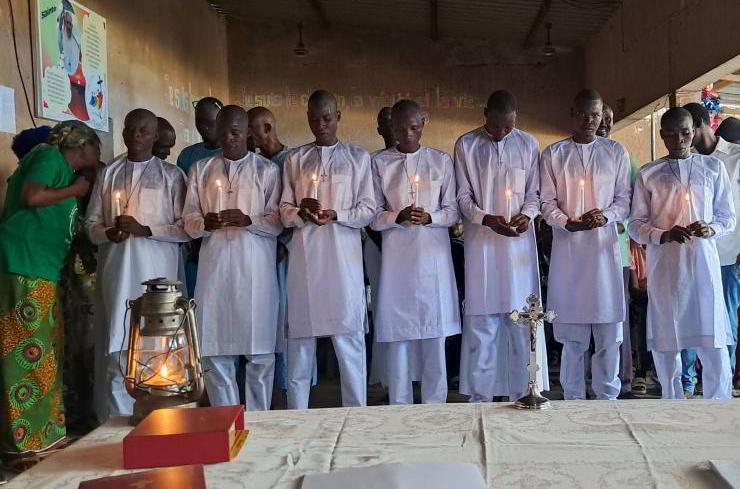Even behind bars, new life is celebrated. Seven young inmates were baptized in Klessoum Prison, in the Chari-Baguirmi Region in the heart of Chad. Father Renzo Piazza, head of prison ministry, describes it for us.
The activities of the small team in charge of prison pastoral care include preparing for the weekly Mass, teaching men and women to read and write, and providing catechesis in preparation for baptism. After four years of preparation, seven young inmates were ready to receive baptism.
For several weeks, the seven inmates were the centre of everyone’s attention and prayer. All the final stages of the catechumenate were celebrated for them: the scrutinies, the final call, the exorcisms, the delivery of the Creed and the Our Father, and the anointing of the catechumens.
Just as the final rite of preparation, the anointing with the oil of catechumens, was about to be celebrated, only six showed up. I asked, “Where is the seventh?” The answer: “He was released… But he will return next week to receive baptism.”
So, on that Saturday, it wasn’t easy to convince the prison authorities to allow a former inmate to return to prison to be baptized, nor to ensure that each of the seven “baptized” could have a family member with them during that solemn moment.
As expected, the celebration attracted a large crowd of people and onlookers. We celebrated under a canopy in terrible heat. It was a celebration full of meaning and life amid so much suffering.
A week later, at seven in the morning, I received a phone call from an inmate: “Father, outside the prison door is the mother of Franklin, one of the newly baptized. She’s waiting for you. She says she wants to attend Mass with us.”
Three hours later, I was on the spot where I found a young-looking woman dressed in white, with a cross around her neck. “I’m Franklin’s mother,” she said, as she greeted me.
Once inside, to my surprise, the prison director, though he knows me well, ordered a search of the case containing my small portable altar. A zealous soldier, who speaks only Arabic like his boss, immediately identifies the “corpus delicti“: the (half-full) cruets containing wine and water. He immediately takes them to the director, who, after smelling them both, declared them to be “Marissa,” meaning “alcohol.” And he confiscated them.
I explain, “We need them for Mass. We can’t celebrate without wine.” He, with gestures, makes me understand that there is no alternative: “Either this or nothing.” And so, on the very day of the Solemnity of the Body and Blood of the Lord, we celebrate only the Word of God. During the celebration, Franklin’s mother gets up and begins to dance. After her, her son, dressed in a white robe, and then the two of them together, around the altar, surrounded by the shouts of joy from the other inmates. Truly, these were gestures of authentic liturgy, to which we are unaccustomed.
On Sunday morning, I found this message on my phone, “Good morning, Father. It is with great sadness that I learned of the contempt you have been subjected to due to the irresponsible and unprofessional behaviour of our staff. May God soothe your heart and give you strength. Try to understand what happened, which must have seemed like a kind of persecution.” These words, written by a Christian soldier serving in the prison, touched me more than his superior’s gesture.
The following Saturday, I met with the new prison director, who apologised for the inconvenience of the cruets. She explained, “I’m a Protestant Christian. I tried to explain to the director, who is Muslim, what Mass means to you Catholics, also telling him that wine is used in very small quantities and only by the celebrant.”
And so, I was able to retrieve the wine cruets and celebrate the Eucharist. I noticed, however, a certain excitement among the inmates; they spoke in low voices, visibly satisfied. One of them said to me, “You see, Father, God never does things by halves. He always manages to do things well. And, lo and behold, the prison director, who disrespected Christ’s minister, has been removed from his post.” Another added, “Yes, God has done justice. Whoever tried to mock Him now finds himself repaid in due course.” Everyone interpreted the change of direction as “a sign from God,” a small lesson for those who had been disrespectful.
I tried to restore some balanced common sense among the inmates, telling them that, sometimes, one acts out of ignorance or overzealousness, but that we are always called to understand and forgive. The final impression I had, however, was that my words had fallen on deaf ears or been carried away by the wind.
There was, however, a small final consolation: the number of those present at the Eucharistic celebration was steadily growing.






